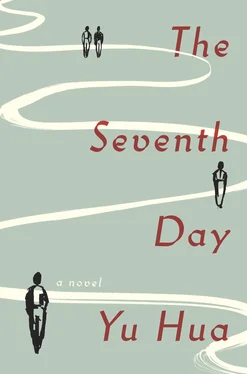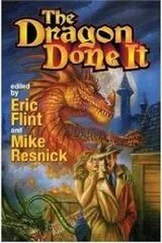Wu Chao sat up in bed, thinking that with that kind of money he could buy a burial plot for Mouse Girl.
He left the bomb shelter and entered the Internet bar. He searched online until he found a phone number. He borrowed a pen and wrote the number on the palm of his hand, then went out to a pay phone and called the number. The person who picked up the phone peppered him with questions until he was sure that Wu Chao was serious, then set up an appointment for them to meet at the Pengfei Tower. Wu Chao couldn’t help giving a shiver when he heard the name.
He arrived at the appointed spot to find the street filled with a clamor of cars and people; he and his shadow huddled together at the foot of the Pengfei Tower. One car after another drove into or emerged from the underground parking lot next to him. Several times he looked up at the piercing sunlight reflected from the tower’s glass windows, but he had no idea where Mouse Girl had stood that day.
A man in a black down jacket came up to him. “You’re Wu Chao?” he muttered.
Wu Chao nodded.
“Follow me,” the man said quietly.
They boarded a crowded bus. A few stops later they disembarked, then boarded another bus. After taking six different buses, they seemed to have reached the outskirts of town. Wu Chao accompanied the man to the entrance gate of a housing development. The man told Wu Chao to go on inside, while he stood by the gate and placed a call on his cell phone. As Wu Chao entered this drab development, he noticed a man emerging from a building not far away. The man tossed his cigarette on the ground and stamped it out as Wu Chao approached. “Selling a kidney?” he asked.
Wu Chao nodded. The man beckoned with his hand, indicating he should follow him into the building. They went down a stained concrete staircase to the basement. The man opened a door, and the air was suddenly rank with the odor of stale cigarette smoke. By a dim light Wu Chao could make out seven people inside, sitting on beds, smoking and chatting. Wu Chao headed for the one unoccupied bed.
Wu Chao handed over his ID and signed an agreement to sell a kidney. He was given a medical examination and a blood sample was taken, then he was told to await the result. He began another underground life, sleeping under a greasy quilt, a quilt that looked as though it had never been washed, and that exuded foul smells accumulated from its many previous users. The man who had brought him to the basement visited twice a day, issuing to the men inside packs of cheap cigarettes and two meals — cabbage and potato for lunch, potato and cabbage for dinner. The room had neither tables nor chairs, so they all sat on their beds to eat, apart from two who squatted on their haunches. The fetid odor that wafted through the basement was held in check only when the men were smoking. When they slept, Wu Chao would wake up sometimes, oppressed by such a powerful stench he felt as though his chest were being squeezed.
The other men, all young, chatted idly as they smoked, exchanging notes about conditions at construction sites and factories and moving companies — it seemed they had worked in lots of different places. Making a pot of money quickly was now their goal: even if they were to slave away as coolies for years and years, they said, they would still not be able to make as much money as if they were to sell a kidney. They were looking forward eagerly to life afterward, when they could buy a smart set of clothes, an Apple phone, stay a few nights in a swank hotel, and eat some meals in an upscale restaurant. After indulging in these expectations, they lapsed back into anxiety, for none of the seven had yet received word that he had been successfully matched with an organ recipient, despite waiting here for over a month. One of them had already visited similar outfits in five other cities, and each time had been sent packing within a matter of weeks, on the grounds that nobody wanted his kidney. The kidney vendors would give him only forty-five yuan for traveling expenses, money he would use to buy his way to another kidney-selling operation. He said that he had not a penny to his name, so all he could do was try like a beggar to keep life and limb together, in one kidney-selling den after another.
This man had seen a lot of the world, and when someone complained how tedious the diet was here — just cabbage and potato — he said it couldn’t be considered bad, for here you at least got tofu once a week and chicken-bone soup once a week as well. He said he’d stayed in a kidney-selling den where for two months straight he ate disgusting food every day of the week.
Somebody raised a question about the safety of kidney surgery. There was, the kidney-racket veteran announced in a tone of authority, no simple answer to that — it was very much a matter of luck. Kidney vendors, he informed them, were an unscrupulous bunch — people with a conscience wouldn’t get involved in this kind of business — and to save money they didn’t hire professional surgeons, who would demand a high price for their services; kidney vendors would bring in veterinary surgeons instead.
When they heard it was going to be vets removing their kidneys, the other men were outraged, cursing the damn vendors for jeopardizing their health just so they could maximize profits.
This man took it all in stride, however, saying, “These days there’s no shortage of wicked people and outrageous behavior, is there? And besides, a vet still counts as a surgeon, and if he makes a habit of cutting out people’s kidneys, he will soon become an old hand and his technique might even be superior to that of a surgeon in a proper hospital.”
What outraged him was that nobody wanted his kidney. He said he’d had rotten luck the whole time, never once matched with a transplant recipient. Every year, he said, there were a million people suffering from kidney disease who depended on dialysis for survival, but there were only about four thousand legal kidney transplants. How was it possible that nobody wanted his kidney? There should be a million people who need it! The only explanation was that those sons of bitches responsible for matching patient and donor were failing to apply themselves properly to their work, with the result that his perfectly good kidney had gone neglected for almost a year now. If this time, too, he was given his marching orders, he said, he was going first to burn some incense in a temple and beg the bodhisattva to help him sell his kidney in double-quick time, and then get another train ticket and head off to the next kidney-selling den.
Wu Chao said nothing after arriving in the basement, but simply listened indifferently as the men gossiped about this and that, and even when he heard how veterinary surgeons performed the operations, he remained unmoved; it was only when he thought of Mouse Girl that his heart would ache. He prayed that he would be matched successfully as soon as possible, so that he could purchase a burial plot for Mouse Girl with minimum delay. But the seven men in the basement had already been waiting so long, and one had yet to be matched successfully even after almost a year, and this made him deeply anxious. He was stricken with insomnia; on his soiled and smelly bed he tossed and turned, unable to fall asleep.
On Wu Chao’s sixth day in the basement, the meal-delivery man appeared at a different time than usual. He opened the door and called, “Wu Chao!”
Before Wu Chao had time to react, the other seven men in the basement looked at each other and realized that none of them had this name — Wu Chao had to be the one who had said not a word since his arrival. “So soon!” they exclaimed.
“Wu Chao, you’ve got a match,” the man at the doorway said.
Wu Chao flung aside the greasy quilt and put on his clothes and shoes under the envious gaze of the other seven. As he walked toward the door, the man who had visited kidney-selling dens in five cities spoke up. “You’re a sly one,” he said.
Читать дальше











